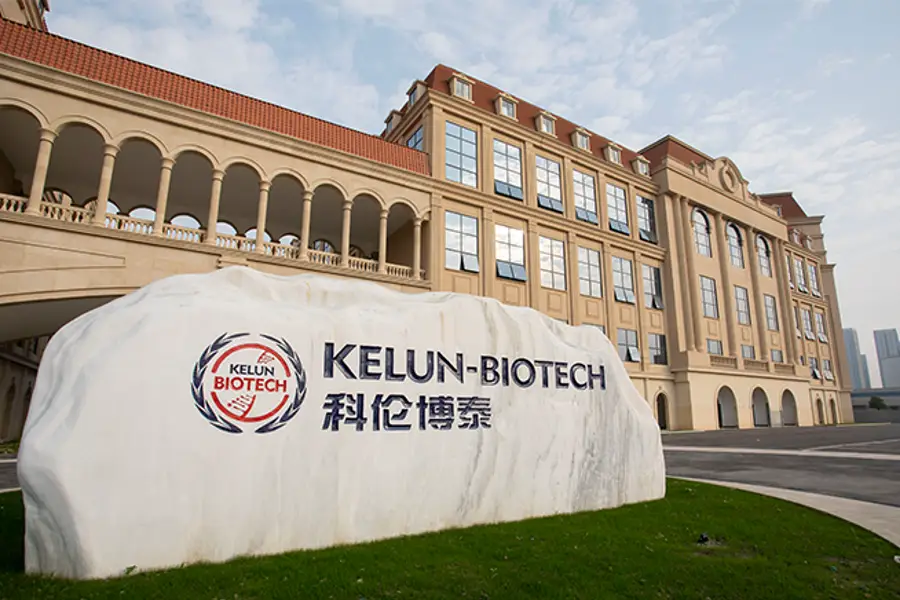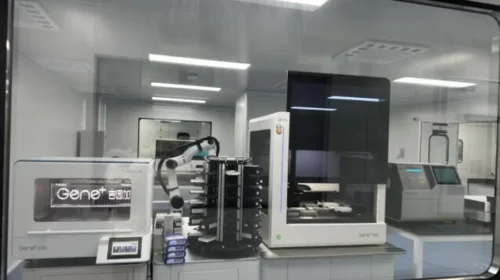Precision cancer drugs show promise for Kelun-Biotech

The company reported rising sales of its signature cancer drug and could get national insurance coverage for other key products, potentially boosting full-year earnings
Key Takeaways:
- Topline revenue actually fell in the first half of the year, but investors chose to focus on the positives, including around $43 million in sales of a newly launched antibody-drug conjugate
- Cash reserves and financial assets jumped in the six months, bolstering the firm’s capacity to promote existing drugs and develop other novel treatments
By Molly Wen
Days after suffering an earnings setback, a company should not expect its share price to scale record heights. But a Chinese maker of novel cancer drugs has done just that, defying conventional market logic.
Sichuan Kelun-Biotech Biopharmaceutical Co. Ltd. (6990.HK) reported on August 18 that its revenues fell 31.3% to 950 million yuan ($132.72 million) in the first half of 2025 from the same period a year earlier, swelling its net loss to 145 million yuan.
But over the following days the drug developer’s share price climbed to a record high, pushing its market value above the HK$100 billion ($12.8 billion) mark and landing Kelun-Biotech in the top tier of innovative drug companies listed in Hong Kong.
A closer look at the earnings figures explains the paradox of shrinking revenue and a rising share price. It all comes down to the source of the revenue, whether from actual product sales or from licensing drug rights to other parties.
The main reason for the earnings slippage in the first half was a drop in income from licensing and cooperation deals. Milestone payments from licensing and partnership agreements fell 54% to 628 million yuan compared with the same period of 2024, when revenue was derived entirely from licensing. This time around, the company earned 310 million yuan in commercial drug sales, accounting for 32.6% of total revenue.
Virtually all that income came from a newly launched drug to treat breast cancer, sacituzumab tirumotecan. The drug is an antibody-drug conjugate (ADC), targeting specific proteins on cancer cells to attack tumors with minimal damage to healthy tissue. Sales of the drug, which is aimed at the Trop2 protein, reached 302 million yuan in the period. The half-year numbers were also helped by the fact that payments for the drug were collected promptly, leaving no outstanding invoices.
The product is China’s first domestically developed Trop2 ADC and Kelun-Biotech’s first commercially launched drug. It was approved in November 2024 to treat adult patients with advanced or metastatic triple-negative breast cancer. The drug has been distributed to more than 30 provinces, over 300 cities and more than 2,000 hospitals across China, the company said in its earnings release. More than 1,000 hospitals are generating sales revenue from the drug, it said.
The drug is set to be dispensed more widely to treat other forms of cancer. China’s medical regulators approved the drug in March this year to treat patients with a type of lung cancer characterized by a mutation in the Epidermal Growth Factor Receptor (EGFR) gene. It ranks as the world’s first Trop2 ADC drug to get the green light as a lung cancer therapy, according to the company.
Lung cancer is the most prevalent and deadliest form of cancer worldwide, with nearly 50% of sufferers based in East Asia. EGFR mutations are common in Asia’s lung cancer patients, who run the risk of developing drug resistance after targeted therapy, creating an urgent need for ground-breaking treatments.
Aside from its flagship drug, Kelun-Biotech has gained marketing approval for two other targeted cancer products – a PD-L1 monoclonal antibody called tagitanlimab and a biosimilar EGFR monoclonal antibody based on cetuximab – but they are not yet generating significant revenue. Kelun-Biotech has invested heavily in promoting its products since its signature drug was launched in November last year. Sales and distribution expenses soared nearly 335% in the first half to 179 million yuan, boosted by promotional activities and an expansion of the company’s marketing team.
Three of Kelun-Biotech’s products are being included in China’s annual drug pricing talks. If they gain entry to the national drug reimbursement system, sales could take off. The company is also actively pushing for its anti-cancer ADC, sacituzumab tirumotecan, to be included in various provincial and municipal insurance schemes, including those in Guangdong, Sichuan and Shanghai, which could cut out-of-pocket costs for patients to between 30% and 50%.
Powerful overseas partner
Kelun-Biotech has boosted its cash reserves to fund its R&D and product promotions, raising around $250 million in a share placement in June. By the end of June, its cash reserves and financial assets amounted to 4.53 billion yuan, 47% more than at the end of 2024.
As a leader in China’s ADC industry, Kelun-Biotech has been developing a close relationship with drugs giant Merck & Co. since 2022. The global pharma firm licensed overseas rights to nine of Kelun-Biotech’s candidate ADC drugs, including the cancer treatment sacituzumab tirumotecan, as well as taking a stake in the Chinese company.
Merck pulled out of two preclinical ADC projects with Kelun-Biotech in 2023, choosing to partner with Daiichi Sankyo on three ADC drugs for $22 billion, but its investment in the Chinese company’s core product was unaffected. The earnings report said Merck was pursuing 14 Phase Three trials for sacituzumab tirumotecan globally, covering breast and lung cancers as well as gynecological and gastrointestinal tumors. The two firms are also collaborating on Phase Two trials exploring the drug’s potential as a monotherapy or in combination with other drugs for various solid tumors.
If those overseas trials are successful, demand for Kelun-Biotech’s drugs could soar. Brokerage firm China Securities predicts sales of sacituzumab tirumotecan and tagitanlimab will jump this year, taking the firm’s full-year revenue as high as 2.14 billion yuan and putting it on a path to profitability in 2027. Kelun-Biotech’s current price-to-sales (P/S) ratio is approximately 52 times, higher than the 19 times for RemeGen (9995.HK), which is also active in the ADC field. The premium for Kelun-Biotech indicates that investors are expecting its sales to accelerate in the second half of 2025.
To subscribe to Bamboo Works weekly free newsletter, click here




